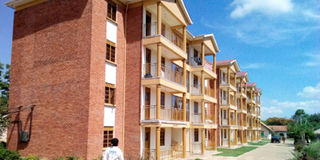Prime
Health workers at Soroti hospital get accommodation

The new structures for the medical staff of Soroti Regional Referral Hospital. PHOTO BY SIMON EMWAMU
Soroti- At least 24 health officers at Soroti Regional Referral Hospital will not have to pay for accommodation after the completion of storeyed structures funded by government.
Mr Samuel Dima Olinga, the secretary of welfare and housing committee, said the health workers have relocated to the new facility which has 24 apartments.
“Each apartment comprises two bedrooms, sitting room, kitchen, store, toilet and bathroom,” he said.
The construction
The construction of this facility started in 2015, through capital development fund at a cost of Shs4.4 billion.
“More than 100 of the 265 established staffs applied for accommodation but only 24 officers were given allocations” Mr Olinga said.
He said the officers were sleeping under dilapidated structures.
Mr Olinga added that the allocations were given to the occupants in accordance to the Public Service Standard Order Criteria for Housing 2010.
He added that the welfare committee allocated apartments basing on the nature of work by an officer; those handling emergencies were considered most, officers of seniority, distance from the work place and the size of family.
He said among the beneficiaries are, one medical officer, allied staff in the clinical, orthopedic, laboratory departments, technical staff and other support staff.
The hospital director, Dr Michael Mwanga, said there is still need for accommodation facilities to cater for the overwhelming population of health workers.
He appreciated government for the financial support for the three storeyed structures.
Dr Mwanga said the housing was a relief to occupants who have been living in dilapidated structures, which were constructed in the 1950s.
Health sector
Uganda is crippled by medical brain drain that has seen the country’s top cream leave for greener pastures.
Lack of a political will by the government to attract and retain the few health workers left behind through better remuneration has hampered the process of building a resilient and a responsive health system.
Lack of accommodation for health workers contributes to staff absenteeism and shortage in the sector and affects the country.
[email protected]



